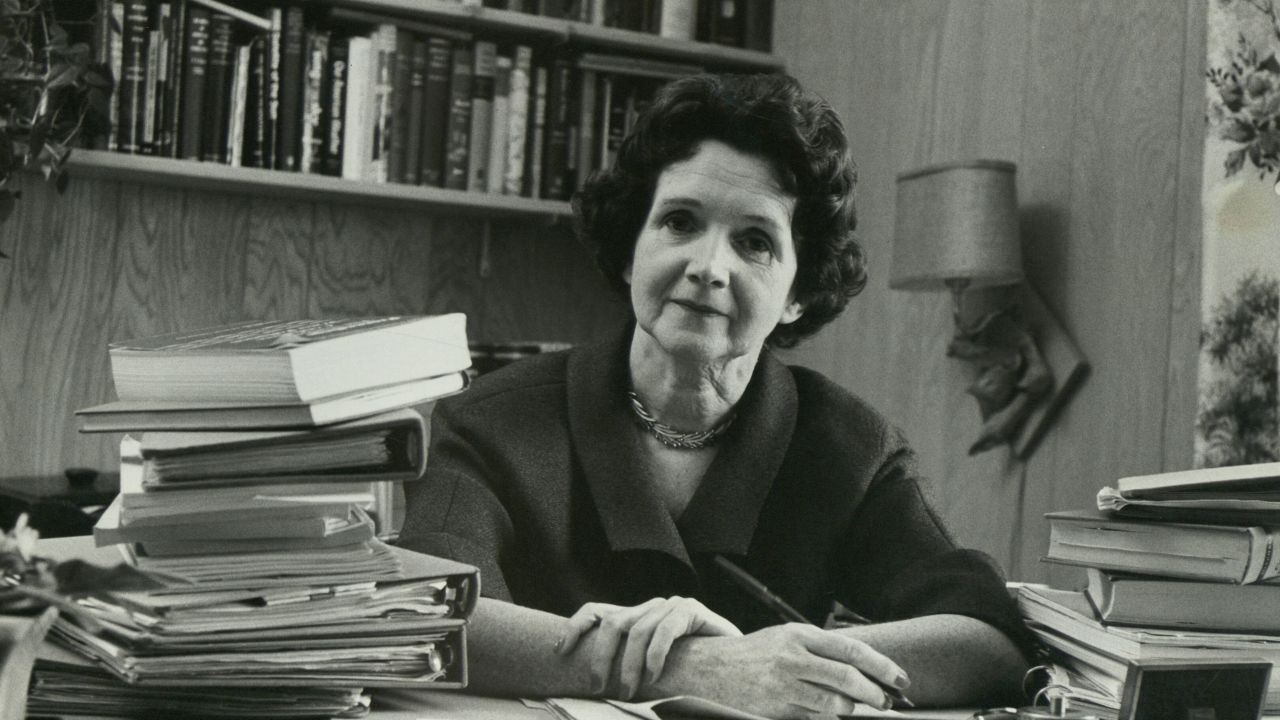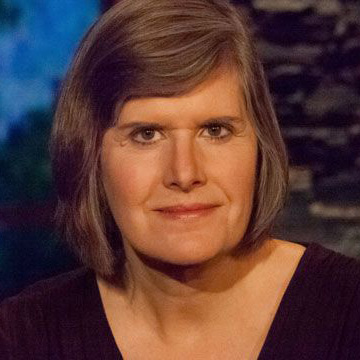
Portrait of American marine biologist and conservationist Rachel Carson (1907-64) in her office in Maryland, Aug. 1962. (Photo by Alfred Eisenstaedt/The LIFE Picture Collection/Getty Images)
Adapted and updated from a keynote address to the Rachel Carson 75th Anniversary Jubilee Celebration and Colloquium in Washington, DC on Nov. 30.
“For many years, public-spirited citizens throughout the country have been working for the conservation of the natural resources, realizing their vital importance to the nation. Apparently, their hard-won progress is to be wiped out, as a politically minded administration returns us to the dark ages of unrestrained exploitation and destruction. It is one of the ironies of our time that while concentrating on the defense of our country against enemies from without, we should be so heedless of those who would destroy it from within.”
Those are Rachel Carson’s words, and they appeared in The Washington Post as a letter to the editor, shortly after the 1952 presidential election. General Dwight D. Eisenhower, a man with little political experience, had just won the White House. Republicans held majorities in both houses of Congress, and a newly re-elected Joseph McCarthy was the ascendant chair of the Senate’s Subcommittee on Investigations.
The trigger for Carson’s letter was the replacement of the long-standing director of the US Fish and Wildlife Service with a pro-business appointee whom Carson saw as unqualified. Rachel Carson, who would go on to become the inspiration for the modern environmental movement, was at the time a marine biologist employed by the agency.
Are Carson’s words relevant to us in the environmental movement now? If so, should they offer us solace in the recognition that, truly, there is nothing new under the sun — including, apparently, bitter despair on the part of environmental leaders when confronting an administration hostile to the goals of what was formerly called conservation and what we now call sustainability?
Carson’s transformational book, Silent Spring, arose out of the dark, paranoid years of McCarthyist America. If I quote from it now — “the obligation to endure gives us the right to know” — do their passages offer us consolation?
They shouldn’t. And it is not my intent to console.
Indeed, were I to use Carson’s own words to lessen our collective terror about the days ahead, I would be administering, to quote Silent Spring itself, “little tranquilizing pills of half truth” at a time when the very pillars of our republic are being pulled down around us and the Antarctic ice shelf is breaking up from the inside out.
So, let’s not try to soothe ourselves with the belief that Rachel Carson got through this and so will we. Our situation is different and more dire.
The first and most obvious difference: President-elect Eisenhower was the former commander of NATO. President-elect Trump is a mentally unstable, proudly ignorant, celebrity tycoon and sexual predator of unbounded ego, without any evident sense of self-sacrifice, self-discipline or service to country. Far beyond firing individual public servants and replacing them, Trump threatens to dismantle, defund or delegitimize entire agencies — including the US Environmental Protection Agency, an office that was Carson’s idea to begin with.
Democracy, like the climate itself, has tipping points. If systematically damaged, if pushed beyond recovery, democratic institutions can — like polar sea ice — simply disintegrate.
A second difference: Six decades ago, Carson’s reference to the efforts of “public-spirited citizens” to protect the natural resources of the nation was understood as an easy appeal to patriotism. By contrast, any noun with the word “public” in front of it is now, in the eyes of the GOP, something to be feared, loathed, privatized, fracked or vouchered into oblivion.
Public schools. Public health. Public housing. Public lands. Public interest.
They’re all target practice for a president-elect happy to turn over diplomacy to a US oilman with business interests in Russia. ExxonMobil CEO Rex Tillerson, Trump’s pick for secretary of state, dreams of drilling the Arctic with an assist from Russian President Vladimir Putin, with whom he has long relations. We are in uncharted waters.
A third difference: Sputnik-era reverence for science has been replaced by wholesale rejection of science and facts. Carson’s biggest challenge, as a woman, was to be viewed as a credible messenger of science. Her opponents in industry had the same objective. Hence, when the Velsicol Chemical Corporation sent its spokesperson, Walter White-Snow, to denounce her findings on television, he was filmed wearing a white lab coat and sat in a room that looked vaguely like a laboratory. On camera, he accused the biologist of “gross distortions of the actual facts, completely unsupported by scientific experimental evidence and general practical experience in the field.”
Carson countered by urging her audience — as she did most eloquently in a speech before the Boston Garden Club — to ask who speaks for science and why. And she made her case directly. Ultimately, pesticides are not effective, she argued, because sooner or later, the targeted pests evolve resistance to the chemical poisons arrayed against them. Further, environmental influences that harm other species are likely to harm us as well, given the evolutionary ties that bind us. “It would be hard,” she pointed out, “to find any person of education who would deny the facts of evolution.”
It’s no longer so hard, dear Rachel. Indeed, facts of all kinds are now available for denial, including the Darwinian ones.
At least nine senior members of Trump’s transition team deny the facts of climate change — including those overseeing agencies responsible for monitoring or otherwise managing it. On the same day that freakishly high temperatures in the Arctic were making headlines in scientific journals and the state of Tennessee caught fire, in a massive conflagration stoked by drought that killed 13 people, the Trump team derided the settled science on climate change as “a bunch of bunk.”
These kind of comments — along with his continued appointments of outspoken climate deniers to his transition team and Cabinet — prompted 800 US earth scientists and energy experts to send President-elect Trump a sharply worded open letter. In it, the scientists urged him to, among other things, acknowledge reality. “If not, you will become the only government leader in the world to deny climate science.”
The scientists’ letter follows close on the heels of a briefing book sent to Trump by former US military leaders that urges much the same — on the grounds that climate change presents a direct risk to national security and US military readiness, especially as it involves naval bases threatened by rising seas.
The response to these warnings? Trump appointed as the head of the US Department of Energy known climate denier Rick Perry who, as governor of Texas, has a long track record of championing fossil fuels, censoring scientists, expurgating mentions of climate change from government reports, and, most famously, calling for the elimination of the DoE itself.
Chillingly, in a 74-point questionnaire, the Trump team also asked the DoE to provide a list of employees who had ever attended United Nations climate meetings, who had promoted President Obama’s climate policy or who were engaged in research on the social costs of carbon — specifically targeting staffers in national laboratories. (The DoE has refused to comply.)
So yes, climate scientists appearing on political hit lists reiterates events of the early 1950s, when atomic scientists in federal agencies were hauled before the House Un-American Activities Committee as part of the Red Scare witch hunts witnessed by Rachel Carson herself, who lived through them. But here’s where the similarities end. Robert Oppenheimer and his physicist colleagues were hounded and investigated for suspected ideological beliefs — not for their understanding of subatomic particles. By contrast, in 2016, the facts of science themselves are under attack along with those who discover them.
As I write, federal climate scientists are frantically downloading their data onto independent servers, concerned that public databases and inventories of crucial environmental measurements may disappear entirely under the Trump regime. Called “guerrilla archiving,” the panic that drives these efforts signals not a return to the 1950s but our arrival into an entirely new political landscape in America, where public-mindedness no longer exists as a basic tenet of government and entire bodies of knowledge about our common environment are at risk of extraordinary rendition.
So, are there words from environmentalism’s patron saint that we might take with us into this new age as we attempt to regain our footing and organize a massive resistance?
There are a few that I find particularly relevant. From Silent Spring:
“The ‘control of nature’ is a phrase conceived in arrogance, born of the Neanderthal age of biology and philosophy, when it was supposed that nature exists for the convenience of man.”
For me, the above passage serves as counterpoint and antidote not only to the disinformation of climate denialism but to the poisonous “alt-right” rhetoric now unleashed among us. To wit, the declaration of white supremacist Richard Spencer in a speech to followers who had gathered in Washington DC on Nov. 19, 2016 to celebrate Trump’s victory:
“America was until this past generation a white country designed for ourselves and our posterity. It is our creation. It is our inheritance. It belongs to us…. For us, it is conquer or die…. To be white is to be a striver, a crusader, an explorer, and a conqueror.”
From a 1963 interview given near the end of her life, Carson throws shade on the “alt-right” white nationalist thugs of Trump’s America in 2016:
“We still talk in terms of conquest. We still haven’t become mature enough to think of ourselves as only a tiny part of a vast and incredible universe. Man’s attitude toward nature is today critically important simply because we have now acquired a fateful power to alter and destroy nature.”
And, from a letter to her beloved, Dorothy Freeman, Carson reminds us all of the indivisible connection between courage and speech:
“To sin by silence when they should protest makes cowards out of men.”
If you need some words to write on a picket sign for your next act of civil disobedience at a fossil fuel construction site, you couldn’t do better than those. I’ll see you there.




